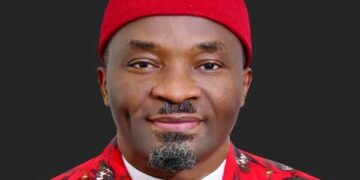Top United Nations (UN) officials on Monday in New York called for urgent action to rescue the UN’s Sustainable Development Goals (SDGs) and revive international cooperation.
Speaking at the Economic and Social Council (ECOSOC) annual forum on financing for development, they warned that a staggering 4 trillion dollars annual financing gap threatened global development goals.
The officials: UN Secretary-General, António Guterres; President, General Assembly Philémon Yang; and President, ECOSOC, Bob Rae, stressed the need for more resources and a global financial overhaul.
Without an effective response, they stressed, the world risked falling even further behind on ending poverty, fighting climate change, and building new sustainable economies.
Last week, the World Bank and International Monetary Fund (IMF) held Spring Meetings where global growth, trade tensions and the rising debt burden in developing countries were front and centre.
“This year’s ECOSOC Forum comes at a pivotal time,” Guterres told delegates, warning that global cooperation itself was under threat.
He pointed to rising trade tensions as a major risk, noting that fair trade was a clear example of the benefits of international collaboration.
Guterres said the surge in trade barriers posed a “clear and present danger” to the global economy.
He said this was evident in recent downgrades to global growth forecasts by the IMF, the World Trade Organization (WTO), and UN economists.
“In a trade war, everybody loses – especially the most vulnerable countries and people, who are hit the hardest,” he said.
Guterres highlighted how many donors were pulling back from aid commitments while soaring borrowing costs drained public investments, putting the SDGs “dramatically off track.”
“With just five years to reach the SDGs, we need to shift into overdrive,” he stressed.
UN chief urged countries to deliver bold outcomes at the upcoming Fourth International Conference on Financing for Development, in Seville, Spain.
“Against this turbulent background, we cannot let our financing for development ambitions get swept away,” Guterres stated.
ECOSOC President Bob Rae echoed these concerns, emphasising that over three billion people live in countries where governments spend more on interest payments than on health or education.
“We desperately need a more affordable debt architecture – it’s that simple,” he said.
Rae called for urgent reforms that would allow countries a fair chance to repay what they owed while investing in their futures.
He also sounded the alarm over rising trade barriers citing recent moves by major economies, like the United States, to impose new tariffs.
“Trade is not a four-letter word, it is a positive way for countries to exchange goods and services and emerge from poverty,” Rae said.
He urged countries not to see trade as a zero-sum game, where there are only winners and losers.
Rae admonished them to embrace fair, open trading systems as a path to shared prosperity.
General Assembly President Philémon Yang underscored the consequences of rising debts and shrinking fiscal space.
According to him, in more than 50 developing countries, governments now spend over 10 per cent of their revenues on debt servicing.
The UN economist said that in 17 of them, debt servicing gulps over 20 per cent, which is a clear warning sign of default.
“Our inability to reform the international financial architecture is severely restricting capital access,” Yang warned.
He stressed that closing the financing gap now estimated at over 4 trillion dollars annually was critical to achieving the SDGs.
“Time is of the essence. Let us use this ECOSOC Forum to bridge divides, build trust, and lay the foundation for success,” he said.
The 17 Sustainable Development Goals are all interconnected, for instance progress on SDG 2 to end hunger is closely tied to advances in health and education.
As negotiations continue towards an agreed outcome in Seville, Secretary-General Guterres highlighted three priority areas.
They include tackling unsustainable debt, strengthening multilateral development banks and unlocking new streams of sustainable finance.
He called for mobilising more domestic resources, innovative financing solutions, better controls on illicit financial flows and stronger partnerships with the private sector.
ECOSOC President Rae added that the conversation must move beyond declarations to concrete, measurable action.
“We need innovation, creativity and partnerships that deliver lasting and transformative impact,” he said.
The News Agency of Nigeria (NAN) reports that the Fourth International Conference on Financing for Development will hold from June 30 to July 3 in Seville, Spain.
It represents a critical opportunity to rebuild the global financial system to unleash the investments urgently needed to achieve the SDGs. (NAN)







































Discussion about this post